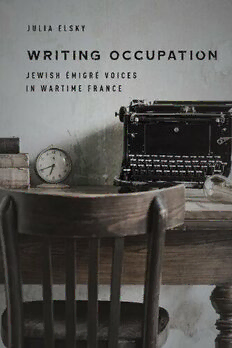
Writing Occupation: Jewish Émigré Voices in Wartime France PDF
Preview Writing Occupation: Jewish Émigré Voices in Wartime France
WRITING OCCUPATION Stanford Studies in Jewish History and Culture W RI T I N G O CC U PAT I O N Jewish Émigré Voices in Wartime France o JULIA ELSKY Stanford University Press Stanford, California Stanford University Press Stanford, California Published in association with the United States Holocaust Memorial Museum. ©2020 by the Board of Trustees of the Leland Stanford Junior University. All rights reserved. No part of this book may be reproduced or transmitted in any form or by any means, electronic or mechanical, including photocopying and recording, or in any information storage or retrieval system without the prior written permission of Stanford University Press. The opinions expressed in this book are those of the author and are not necessarily those of the United States Holocaust Memorial Museum. Printed in the United States of America on acid- free, archival- quality paper Library of Congress Cataloging- in- Publication Data Names: Elsky, Julia, author. Title: Writing occupation : Jewish émigré voices in wartime France / Julia Elsky. Other titles: Stanford studies in Jewish history and culture. Description: Stanford, California : Stanford University Press, 2020. | Series: Stanford studies in Jewish history and culture | Includes bibliographical references and index. Identifiers: LCCN 2020025606 (print) | LCCN 2020025607 (ebook) | ISBN 9781503613676 (cloth) | ISBN 9781503614369 (epub) Subjects: LCSH: French literature—Jewish authors—History and criticism. | French literature—20th century—History and criticism. | Jewish authors—France—Language—History—20th century. | French language—Political aspects—History—20th century. | World War, 1939–1945—France—Literature and the war. | France—History— German occupation, 1940–1945. Classification: LCC PQ150.J4 E47 2020 (print) | LCC PQ150.J4 (ebook) | DDC 840.9/21296—dc23 LC record available at https://lccn.loc.gov/2020025606 LC ebook record available at https://lccn.loc.gov/2020025607 Typeset by BookComp, Inc. in 10.25/15 Adobe Caslon Pro Cover design by Rob Ehle Cover credit: Rouzes | iStock For my parents, Martin and Harriet Elsky, and in loving memory of my grandmother, Elaine Sloan CONTENTS Acknowledgments ix Introduction Jewish Émigré Writers and the French Language 1 1 A Jewish Poetics of Exile: Benjamin Fondane’s Exodus 29 2 Accents in Jean Malaquais’s Carrefour Marseille 63 3 European Language and the Resistance: Romain Gary’s Heteroglossia 93 4 Buried Language: Elsa Triolet’s Bilingualism 129 5 Displacing Stereotypes: Irène Némirovsky in the Occupied Zone 165 Epilogue Memory, Language, and Jewish Francophonie 203 Notes 213 Index 259 ACKNOWLEDGMENTS In writing a book about French as an adopted language, I have also received an education in writing in my own tongue. For this, and for so much more, I thank Alice Kaplan. Without her guidance, endless generosity, and expertise, this book would not have been possible. I also thank Maurice Samuels for his kind support throughout the process. Maurice Samuels, Bruno Cabanes, and Thomas C. Connolly gave substantive feedback in this project’s early iterations. I am grateful to them and to my professors Christopher L. Miller and Edwin Duval for all that they taught me, not least about intellectual rigor. In some ways I set off on this project when Serge Gavronsky told me about the rediscovery of Irène Némirovsky during my time as his student at Barnard College. I thank my professors at Barnard, Laurie Postlewate, Serge Gavronsky, and Peter Connor, as well as Elizabeth Castelli and Tim Halpin- Healy in Barnard’s Centennial Scholars Program, all of whom inspired me and encouraged me to go to France and seek adventure in the archives. My year at the Freiburg Institute for Advanced Studies at the Albert- Ludwigs- Universität Freiburg, which was funded by the Andrew W. Mellon Foundation and the Volkswagen Foundation Postdoctoral Fellowship for the Humanities in Germany, provided me with the time and environment to write much of this book. This writing was nourished by stimulating conver- sations with Bernd Kortmann, Carsten Dose, Britta Küst, Marco Caracciolo, Benoît Dillet, Sabine Hake, Suzanne Romaine, and Andrew Port. Since
